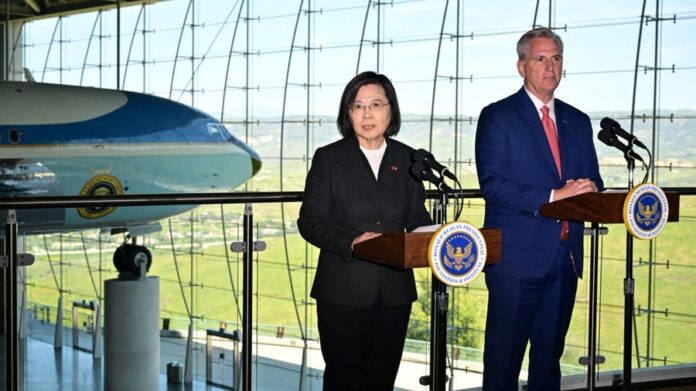China sent warships and aircraft near Taiwan for a second day on Friday, Taipei said, after President Tsai Ing-wen angered Beijing by meeting with US House Speaker Kevin McCarthy, according to France24.
Three Chinese warships sailed in waters surrounding the self-ruled island, while a fighter jet and an anti-submarine helicopter also crossed the island’s air defence identification zone, Taiwan’s Ministry of National Defence said.
On Wednesday, China’s Shandong aircraft carrier, one of two in its naval fleet, sailed through Taiwan’s southeastern waters on its way to the western Pacific, hours before Tsai met McCarthy in Los Angeles.
Beijing, which views Taiwan as part of its territory, had repeatedly warned against the meeting, and reiterated on Thursday that it would take “forceful measures to firmly safeguard national sovereignty”.
Tsai told reporters her government was committed to ensuring “the free and democratic way of life of the people of Taiwan” before she left Los Angeles, where she was stopping on her way back from Latin America.
“We also hope to do our best to maintain peace and stability between the two sides,” she added.
Its response to the Tsai-McCarthy meeting has so far been on a much lower level, but still left Taiwan on alert.
Premier Chen Chien-jen said on Friday that Taiwan’s defence and security agencies were keeping a close eye on developments, and asked “the public to rest assured”.
On Thursday, the defence ministry said three warships had been detected around the Taiwan Strait and one Chinese naval helicopter crossed the island’s ADIZ.
The display prompted calls from the United States asking China “to cease its military, diplomatic and economic pressure against Taiwan and instead engage in meaningful diplomacy”.
McCarthy, who is second in line for the US presidency, had originally planned to go to Taiwan himself but opted instead to meet Tsai in California.
The decision was viewed as a compromise that would underscore support for Taiwan but avoid inflaming tensions with China, a move analysts say has so far proven successful.
Tsai said on Thursday that it was “quite common for us to meet our US friends during transits,” she said. “I also hope the Chinese side can exercise self-restraint and don’t overreact.”
McCarthy had vowed that US arms sales to Taiwan – which infuriate Chinese leadership – would continue, in what he said was a proven strategy to dissuade aggression.
Tsai acknowledged the weapons deal on Thursday but did not provide further details.
On Friday, China slapped sanctions on Taipei’s de facto ambassador to the United States, Hsiao Bi-khim, banning her from entering China and accusing her of “deliberately inciting cross-strait confrontation”.
Beijing’s foreign ministry also announced sanctions against the Hudson Institute, a Washington-based conservative think-tank, as well as the Ronald Reagan Presidential Library, for „providing a platform and facilitating Tsai Ing-wen’s engagement in ‘Taiwan separatism’ activities in the United States”.
The two organisations are now barred from engaging in transactions and cooperation with Chinese entities, while four individuals linked to them are blocked from entering or conducting business in China.


